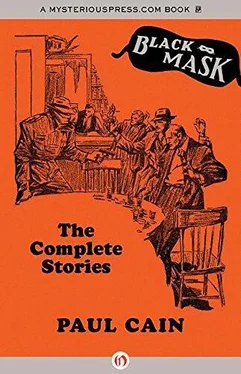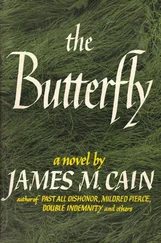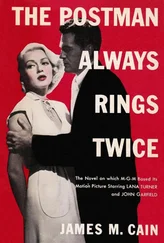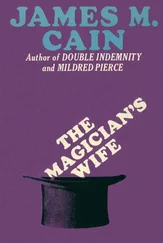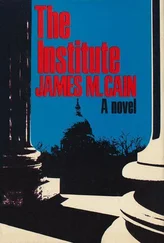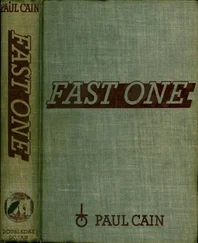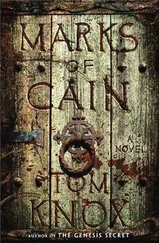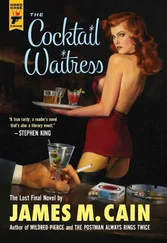Granquist opened the door suddenly, got out on the sidewalk on the other side of the car. She held her arms stiff at her sides and her hands were clenched; she was trembling violently. She walked up the sidewalk about thirty feet — walked as if she was making a tremendous effort to walk slowly. Then she turned and leaned against a telephone pole and looked back at the car.
Kells watched her. He could not see her face in the darkness, only the dim outline of her body. He turned slowly to Borg.
“You can wait here,” he said. “Or maybe you’d better wait down at the first corner this side of Ansel’s. And stay with the car — both of you.”
Borg said: “All right.”
Kells walked up to Granquist. He stood looking down at her a little while, asked: “What’s the matter, baby?”
Her voice, when she finally answered, was elaborately sarcastic. “What’s the matter? What’s the matter?” Then her tone changed abruptly — she put one trembling hand on his arm. “Gerry, for God’s sake, don’t do this,” she said. “Let it go — please — this time...”
He was smiling faintly. He shook his head very slightly.
She took her hand from his arm. Her voice was suddenly acid, metallic. “You — and your goddamned pride! Your long chances — your little tin-horn revenge!” She laughed shrilly, hysterically. “You’ve seen too many gangster pictures — that’s what’s wrong with you...”
Kells was staring at her expressionlessly. He turned abruptly, strode back towards the car.
She was behind him, sobbing, trying to hold his arm.
“Gerry!” Her voice was blurred by tears. “Gerry — can’t you think of me a little — can’t you let this one thing go — for me? For us?”
He shook her hand off his arm, spoke briefly to Borg: “An’ stay with the car this time — I’ll be wanting it in a hurry, when I want it.”
Borg said: “Okay. First corner this side of the joint.”
Kells went back to the cab, got in, said: “Take me down to Gardner, about a half-block the other side of the Boulevard.”
Fifty-eight grunted affirmatively and swung the cab around in the narrow street.
Kells glanced back through the rear window. Granquist was standing motionlessly in the middle of the street, silhouetted against the glow of a street light on the far corner.
It began raining harder, pounded on the roof of the cab. Fiftyeight started the windshield wiper and it swished rhythmically in a wide arc across the glass.
They stopped in the shelter of a wide palm on Gardner. Kells got out.
Fifty-eight asked: “Can I help, Mister Kells?”
Kells shook his head. “I’ll make out.” He peeled two bills off the roll in his pocket, handed them to the little Irishman. He turned swiftly and went into the darkness between two houses, heard Fiftyeight’s “Thank you, sir,” behind him.
The driveway ended in a small garage; there was a gate at one side of it leading to a kind of narrow alley. Kells crossed the alley and walked north along a five-foot board fence for about a hundred feet. Then he climbed over the fence and went across a vacant, weed-grown lot towards the rear end of the building that housed Ansel’s.
It was a three-story business block, dark and forbidding in the rain; no light came from the rear, and the side that Kells could see seemed entirely windowless. He remembered that at one time it had been a scenery warehouse.
It was raining hard by now — he rolled his coat collar up, pulled the brim of his soft hat down.
He slipped once in the mud, almost fell. In righting himself he remembered his wounded leg suddenly, sharply. It was throbbing steadily, swollen and hot with pain.
He went close to the building. It was very dark there, but looking up he could see the vague outline of a fire escape against the yellow glow of the sky.
He smiled to himself in the darkness, put the back of his hand against his forehead. It was hot, dry.
He felt his way along the wall of the building until he was under the free-swinging end of the fire escape. It was almost four feet beyond his reach. He went back the way he had come, to the fence, went along it until, in the corner the fence made with a squat outbuilding, he found a fairly large packing case. He stood on it and found that it would hold his weight; he balanced it on his shoulder and carried it back into the shadow of the building.
Standing on the box, he could just reach the end of the fire escape; he put his weight on it, slowly. It creaked a little, came slowly down.
When the bottom step was resting on the packing case he crawled slowly, carefully up to the first landing. He lay on his side, held the free-swinging part so that it would come up noiselessly. Then he stood up.
Two windows gave on the second landing. One was boarded up snugly, no light came through. Kells put his ear to it, could hear only a confused hum of voices. The other window had been painted black on the inside, but a long scratch ran diagonally across one of the four panes. He took off his hat, put his eye close to the scratch.
He was looking into the office that ran almost the width of the building, was partitioned off from the big upstairs room by a wall of rough, unpainted pine boards.
The first person he saw was a woman whom he had never seen before. She was sitting on a broad desk, talking to two men. One of the men was in ill-fitting dinner clothes, was unfamiliar — the other man turned as he watched; Kells recognized him as Lieutenant Reilly.
Reilly was heavy, shapeless. A cast in one eye gave his bloated, florid face a shrewdly evil quality. He was holding a tall glass of beer in one hand; he lifted it, drank deeply.
There were two large washtubs full of bottled beer and ice on the floor near the desk.
Another woman, unfamiliar, in a bright orange evening gown, crossed Kells’ line of vision, stooped and took two bottles from one of the tubs, disappeared.
Kells’ lips framed the word “Party.” He was grinning.
Then he saw Ruth Perry. She was sitting on a dilapidated couch at one side of the room. She was swaying drunkenly back and forth, talking loudly to the man beside her. Kells put his ear to the pane but couldn’t quite make out the words.
The man beside her was MacAlmon — MacAlmon who had seen Crotti killed, who had filed the charges against Kells and Granquist and Borg.
Then the rough pine door in the middle of the far wall opened and two men came in. In the moment the door was open, Kells saw a swirl of people around one of the crap tables in the big gambling room. Then the door closed; Kells looked at the two men.
One of them was a short-bodied, long-armed man whom Kells remembered vaguely from somewhere. His face was broad and bland and childlike.
The other was Jack Rose.
Kells slid the big automatic out of its holster.
Rose’s long, tanned, good-looking face was cheerful; his thin red mouth was curved to a smile. He crossed the room, sat down beside Ruth Perry, and spoke across her to MacAlmon.
Kells looked thoughtfully down at the three dark slippery flights beneath him. Looking down made him suddenly dizzy — he blinked, shook his head sharply, put one hand on the railing for support. He thought he was going to be sick for a moment but the feeling passed. He was very hot and the rain felt terribly cold on his head.
Then he looked up again, at the door. There was a big planed two-by-four up and down its middle that could be swung sideways into two iron slots — one on each side of the door.
As he watched, the woman and Reilly and the other man whom he had seen first took up their glasses, went out of the room. That left — as nearly as he could judge — six or seven people. Rose, Ruth Perry, MacAlmon, the short man who had come in with Rose, the woman in the orange dress; perhaps two or three more men or women whom he hadn’t seen.
Читать дальше
